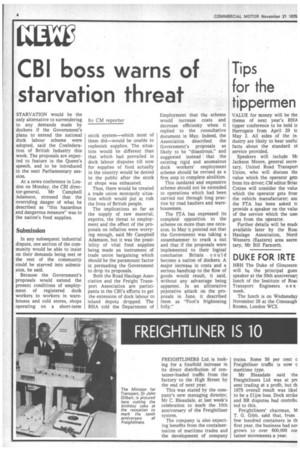CBI boss warns of
Page 6

If you've noticed an error in this article please click here to report it so we can fix it.
starvation threat
by CM reporter STARVATION would be the only alternative to surrendering to any demands made by dockers if the Government's plans to extend •the national dock labour scheme were adopted, said the Confederation of British Industry this week. The proposals are expected to feature in the Queen's speech, and to be introduced in the next Parliamentary session.
At a news conference in London on Monday, the CBI director-general, Mr Campbell Adamson, stressed that the overriding danger of what he described as "this hazardous and dangerous measure" was to the nation's food supplies.
Submission
In any subsequent industrial dispute, one section of the community would be able to insist on their demands being met or the rest of the community ' could be starved into submission, he said.
Because the Government's proposals would extend the present conditions of employment of registered dock workers to workers in warehouses and cold stores, shops operating on a short-term stcck system—which most of them did—would be unable to replenish supplies. The situation would be different than that which had prevailed in dock labour disputes till now for supplies of food actually in the country would be denied to the public after the stock at shops was exhausted.
Thus, there would be created a trade union monopoly situa'don which would put at risk the lives of British people.
The implications so far as the supply of raw material, exports, the threat to employment and the effect of the proposals on inflation were worrying enough, said Mr Campbell Adamson, but it was the possibility of vital food supplies being made an instrument of trade union bargaining which should be the paramount factor in persuading the Government to drop its proposals.
Both the Road Haulage Association and the Freight Transport Association are participants in the CBI's efforts to get the extension of dock labour to inland depots dropped. The RHA told the Department of Employment that the scheme would increase costs and decrease efficierity when it replied to the consultative document in May. Indeed, the Association described the Government's proposals as likely to be "disastrous," and suggested instead that the existing rigid and anomalous dock workers' employment scheme should be revised as a first step to complete abolition.
This outdated and expensive scheme should not be extended to operations which had been carried out through long practice by road hauliers and warehousemen.
The FTA has expressed its complete opposition to the scheme on more than one occasion. In May it pointed out that the Government was taking a steamhammer to crack a nut and that if the proposals were implemented to their logical conclusion Britain could become a nation of dockers. A major increase in costs and a serious handicap to the flow of goods would result, it said, without any advantage being apparent. In an alliterative pejorative attack on the proposals in June, it described them as "Foot's frightening folly."








































































































